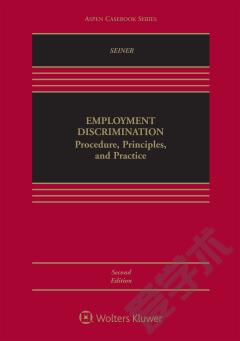Employment Discrimination —— Procedure, Principles, and Practice
----- 就业歧视:程序,原则和实践
This streamlined, straightforward casebook offers a fresh perspective on employment discrimination law, presenting a procedural-based approach (lacking in other texts) with interactive materials. While still providing traditional coverage, Employment Discrimination: Procedure, Principles, and Practice, Second Edition emphasizes the importance of procedural issues in workplace cases. It includes a unique best practices chapter, which discusses the most effective ways to address workplace discrimination from both a theoretical and legal perspective. Numerous exercises and problems foster classroom discussion. Practice tips situate students in the role of a practicing lawyer. Modern, cutting-edge cases demonstrate the importance of employment discrimination law. Text boxes within cases, historical notes, and news events effectively help bring the material to life. New to the Second Edition: A renewed focus on sexual harassment and a robust discussion of the #metoo movement An examination of sexual orientation and a review of the conflicting federal appellate cases on whether it is protected by anti-discrimination laws A new focus on appearance discrimination and the recent case law related to this issue A discussion of how issues evolving in the gig economy can impact workplace discrimination Professors and students will benefit from: Focus on procedure (with theoretical underpinnings) to stimulate practical learning Comprehensive coverage, encompassing topics traditionally included in the course (statutory, regulatory, and administrative issues), but with a timely procedural focus integrated throughout Recent, topical cases which bring the issues to life for students and allow them to see how procedural issues are demonstrated in the employment discrimination context A unique chapter on best practices, which examines the proper training and complaint procedures that employers should have in place; explores policies and procedures for responding to employee reference requests; looks at emerging trends in the workplace, such as social media policies; and covers employee bullying Interactive features (discussion problems, practice/procedural tips, class exercises, notes and questions, graphs/charts, etc.), to foster class discussion and student engagement Chapter-in-review sections that further student comprehension
{{comment.content}}








 京公网安备 11010802027623号
京公网安备 11010802027623号